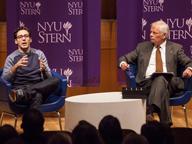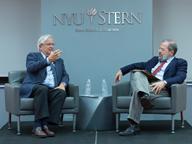Faculty News
—
Prof. Rosa Abrantes-Metz's research on the Libor scandal is cited
—

Excerpt from Bloomberg -- "A lack of regulation has left the foreign-exchange market vulnerable to abuse, said Rosa Abrantes-Metz, a professor at New York University’s Stern School of Business in Manhattan. 'If nobody is monitoring these benchmarks, and since the gains from moving the benchmark are possibly very large, it is very tempting to engage in such a behavior,' said Abrantes-Metz, whose 2008 paper 'Libor Manipulation' helped spark a global probe of interbank borrowing rates. 'Even a little bit of difference in price can add up to big profits.'”
Faculty News
—

Excerpt from Bloomberg -- "A lack of regulation has left the foreign-exchange market vulnerable to abuse, said Rosa Abrantes-Metz, a professor at New York University’s Stern School of Business in Manhattan. 'If nobody is monitoring these benchmarks, and since the gains from moving the benchmark are possibly very large, it is very tempting to engage in such a behavior,' said Abrantes-Metz, whose 2008 paper 'Libor Manipulation' helped spark a global probe of interbank borrowing rates. 'Even a little bit of difference in price can add up to big profits.'”



















